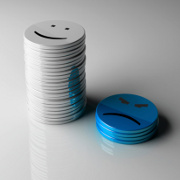 Photo: Getty Images
Photo: Getty Images
When we eat our favorite food, we tend to over-indulge. When we shop at our favorite store, we rarely leave with anything less than what we really can afford. And when we come across a book captivating enough to make us feel a part of the story, we’ll sacrifice sleep or chores to finish the book as fast as we can.
So it would seem that all things that make us happy – including simply, being happy – should be encouraged and explored to the fullest.
But what happens when we’re no longer engrossed in whatever it is that makes us happy? What happens when we are derailed from our happiness high?
A recent study published in "Perspectives on Psychological Science," a journal of the Association for Psychological Science, said that the ongoing pursuit to achieve happiness can actually do the opposite, leaving people with feelings of failure if they do not achieve their goals or ever truly attain "happiness."
The recent study mirrored the findings of University of Virginia psychology professor Shigehiro Oishi who in 2007 had his works published in the Journal of Personality and Social Psychology. Similarly, Oishi and colleagues concluded that the attempt to become happier ultimately lead to greater feelings of dissatisfaction.
Oishi said that “people who become accustomed to numerous positive or happy events in their life are more likely to take a harder fall than people who have learned to accept the bad with the good. And because negative events have such a strong effect when occurring in the midst of numerous positive events, people find it difficult to be extremely happy. They reach a point of diminishing returns.”
For example, when people get married, buy a new car or purchase their first home they feel a happiness high. As soon as they start making payments, struggle financially or argue with their spouse, their happiness is soon diminished but their expectation for being so extremely happy stays the same. They feel worse about not feeling so extremely happy than they would if they otherwise didn’t automatically expect or assume they should be happy.
Co-author of the Perspectives on Psychological Science study, June Gruber of Yale University, emphasized that the tools often suggested for making oneself happy aren’t necessarily bad, “But when you’re doing it with the motivation or expectation that these things ought to make you happy, that can lead to disappointment and decreased happiness,” Gruber said.
Gruber believes the strongest predictor of happiness is having meaningful, social relationships. Thus, Gruber encourages us to stop worrying about being happy and instead divert our energy to nurturing the social bonds we have with other people.
“If there’s one thing you’re going to focus on, focus on that. Let all the rest come as it will,” Gruber said.
It’s certainly a positive thing to be happy and to have an optimistic outlook on life, but the trouble creeps up when we expect and assume to ride our "happy high" all the time and feel even less pleased when we experience lows. The key is to be patient and grateful, and understand that life is a journey filled with ups and downs, twists and turns.
Happiness has a dark side
http://www.eurekalert.org/pub_releases/2011-05/afps-hha051611.php
Association for Psychological Science – Happiness Has a Dark Side
http://www.psychologicalscience.org/index.php/news/releases/happiness-has-a-dark-side.html
When less is more: Too much happiness may be too much of a good thing
http://www.virginia.edu/uvatoday/newsRelease.php?id=3071
Bailey Mosier is a freelance journalist living in Winter Park, Florida. She received a Masters of Journalism from Arizona State University, played D-I golf, has been editor of a Scottsdale-based golf magazine and currently contributes to GolfChannel.com. She aims to live an active, healthy lifestyle full sunshine and smiles.
Edited by Alison Stanton





Add a CommentComments
There are no comments yet. Be the first one and get the conversation started!